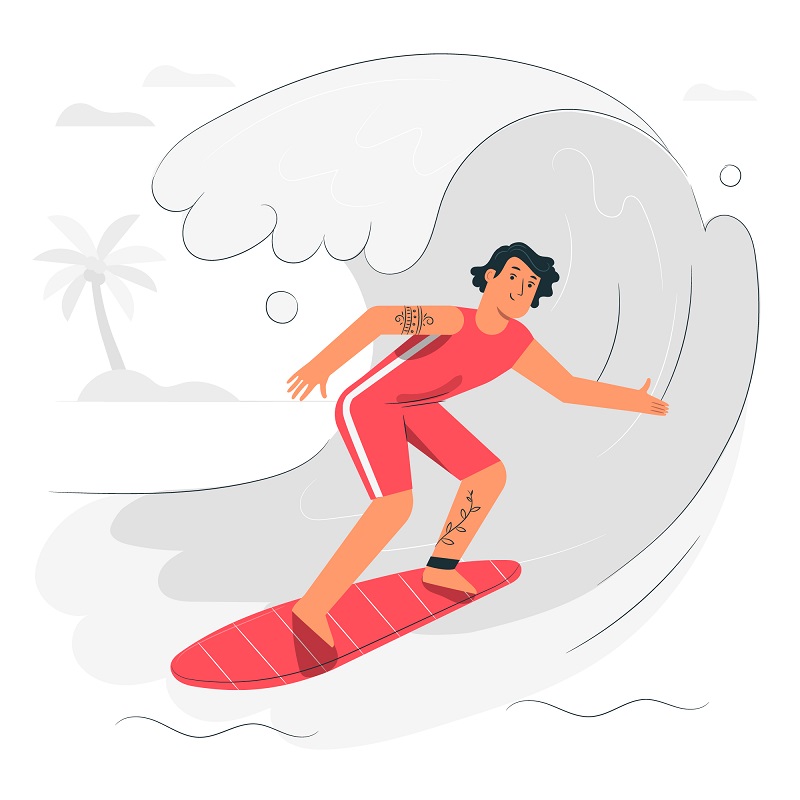Why Taking Surfing Lessons Can Boost Your Skills Faster

Surfing is one of the most exciting and rewarding sports, offering a unique blend of physical challenge, connection to nature, and mental relaxation. But for beginners, learning to surf can be intimidating, as it requires coordination, balance, and an understanding of ocean conditions. While some people choose to teach themselves, taking surfing lessons from a skilled instructor can help you progress more quickly and safely. Here’s how professional instruction can make a real difference in boosting your skills.
1. Personalized Instruction for Faster Progress
One of the main benefits of surfing lessons is the personalized feedback you’ll receive from your instructor. Unlike trying to teach yourself, a professional can observe your stance, positioning, and movements, providing instant feedback to correct mistakes. Small adjustments can make a significant difference in surfing, whether it's where you place your feet or how you distribute your weight on the board. A professional can help you avoid common pitfalls, allowing you to improve your technique faster than if you were learning solo.
2. Proper Technique and Form
Surfing is a physically demanding sport that requires balance, core strength, and agility. Many beginners struggle with the “pop-up” technique, which is the essential motion of moving from lying down to standing up on the board. Instructors like StokeDrift help by breaking down the mechanics of the pop-up, teaching you how to position your body and distribute your weight to avoid falling. This personalized guidance in form and technique ensures that you’re practicing correctly from the start, preventing bad habits that could be harder to correct later on.
3. Building Confidence in the Water
Confidence is key when learning to surf, and lessons can help you build this confidence. The ocean can be unpredictable, and without proper guidance, some people might feel apprehensive in the water. Surfing instructors not only provide reassurance but also help you approach each wave with the right mindset. Overcoming the initial nervousness becomes easier under the supervision of a professional who understands your fears and can support you through challenging moments. This boost in confidence allows you to enjoy the learning process and stay motivated to keep improving.
4. Accelerated Learning with Structured Progression
Learning any new skill requires practice and structure, and surfing is no exception. Surfing lessons provide a structured environment where each session builds on the previous one, helping you progress methodically. Instructors know how to guide you from basic skills to more advanced techniques, ensuring you have a solid foundation before moving forward. This structured approach is especially useful for beginners who might otherwise struggle with knowing what to work on next or feel overwhelmed by the learning process.
5. Access to Quality Equipment and Facilities
For beginners, selecting the right board and equipment can be confusing. Most surfing schools and instructors provide quality boards and gear suited to your skill level, eliminating the guesswork. Using equipment tailored to your needs makes learning easier and more enjoyable. Plus, many surf schools operate in beginner-friendly locations with manageable waves, so you can practice in an ideal setting. Access to this equipment and these conditions can help you make more consistent progress, as you’ll be learning on gear and in environments designed for success.
6. Understanding Ocean Conditions and Safety
Surfing isn’t just about balancing on a board—it’s also about reading and understanding the ocean. Recognizing wave patterns, currents, and tide behavior is crucial to becoming a skilled surfer. Instructors offer guidance on assessing wave conditions and understanding what makes a wave suitable for riding. They’ll also teach essential safety practices, such as how to handle wipeouts, avoid riptides, and use proper board positioning. Learning these safety techniques and developing ocean awareness early on builds a strong foundation that will make surfing safer and more enjoyable as you advance.
7. Building a Lifelong Passion with Community Support
Another underrated benefit of surfing lessons is the sense of community they can provide. Learning with others who share your interests can be incredibly motivating and supportive. Many surf schools organize group lessons, which allow you to connect with other beginners, exchange tips, and share in the excitement of each other’s progress. This camaraderie can help turn a hobby into a lifelong passion, as you’ll have a community to encourage you and celebrate milestones together.
Taking surfing lessons can significantly speed up your learning curve, providing the guidance, structure, and support needed to build skills effectively. So, if you’re ready to catch waves with skill and confidence, consider signing up for lessons—you may just find yourself progressing faster than you ever imagined.